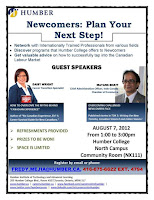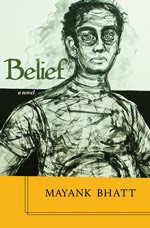 |
| Truly, the better half |
Debra Black interviewing me for the Toronto Star was one of the highlights of 2012. Joyce Wayne, who had temporarily moved to a condominium on Queen Street W, introduced me to Debra, the immigration reporter of the Star. Debra and Joyce were neighbours. And all of us were a part of the group that Joyce had started – published, soon-to-be-published and aspiring authors – at Depanneur, a restaurant that specialised in artisan cuisine, in Little Portugal on Dundas Street West.
The original group comprised Joyce, David Panhale, Dawn Promislow, Jasmine D’Costa, David Cozac, and Leslie Shimotakahara. The group moved away from Depanneur into different restaurants along Dundas West when it began to grow, when Sang Kim, Ava Homa and Debra Black joined. Unfortunately, with all such impromptu writers’ group, it disbanded without a murmur.
Debra interviewed me because I guess she found my experiences as a newcomer to Canada fascinating. The story created some waves – giving me my Warhol-adjudged 15 minutes of fame. I reread the interview while writing this blog, and I think Debra has done a great job getting me to talk in details about things that I'd not have talked about if she hadn't asked; things that a decade later seem sort of significant.
If you’re interested in reading it, click here: Star write-up.
My association with the MG Vassanji's and Nurjehan Aziz's Festival of South Asian Literature and the Arts had widened my circle considerably. By now, I had a growing circle of writer friends and from other creative spheres such as theatre, the arts. These included Jasmine and Nitin Sawant, the husband-wife team that runs the SAWITRI theatre, producing some of the best South Asian theatre in Canada.
I’d met them the previous year at Rang Manch Canada’s multilingual theatre festival, and since then our camaraderie had grown. One of the most memorable performances that I’ve attended which SAWITRI produced in 2012 was Saree Kahaniyaan.
Meena Chopra, the artist and poet, organised the launch of MG Vassanji’s The Assassin’s Song’s Hindi translation called Qatil Ke Geet under the auspice of the Hindi Writers’ Guild. The highlight of this well-attended program was the literary critique of the novel by Shailja Saxena and Sharan Ghai, the stalwarts of the Hindi Writers' Guild.
Munir Parvaiz, who was one of the committee members of the Festival of South Asian Literature and the Arts, gave me a Hindi translation of Noor Zaheer's Urdu memoir about her father Sajjad Zaheer, an active member of the Communist movement in India, and one of the founders of Progressive Writers' Movement in India. Munshi Premchand presided over the first convention of the progressive writers in 1936.
Munir's Writers’ Forum organised a phone chat with Noor Zaheer, based in India. It was a fascinating conversation. Listening to Noor Zaheer speak about her father touched my heart – his simple message to his daughter was that there is no hardship or sacrifices in doing something you believe in. Sacrifice is only when you do something you have to, but don’t believe in.
VI Lakshmanan (better known as Lucky Lakshmanan) sent me through S. Kalyan Sundaram, a copy of the Prosperity and Peace for the Twenty-First Century by APJ Abdul Kalam. It is a compilation of the former President of India’s speeches.
I mention this here for two reasons – the first is I now work at the Canada India Foundation (CIF) and of course, the main reason is Kalam. He epitomizes the best of what India stands for and what it offered – a scholastic mixture of the science and culture, heritage and progress, inclusive ethos and forward thinking.
Kalam – the soft-spoken and the unassuming scientist – has given India and Indians a vision for the future – something that the country and its people could aspire to achieve if Indians put their mind to it. Read a passage from the book here: Tolerance.
 |
| Humber lecture |
Two friends – Murali Murthy and George Abraham launched new ventures. Murali turned into a motivational coach and published several books. Murali supported me immensely during my initial years of struggle with the right sort of motivation.
George, who I’d known since our time together in Bombay as journalists, launched the New Canadian Media, an online news outlet that focused on the news of by for newcomers. It is one of the most significant contributions to Canadian media in recent times. Unfortunately, it's in dire need of funds and George is busy finding ways to keep it afloat.
Humber College invited me to address newcomers and give them career guidance. This was completely surprising. I was being considered an immigrant success story.
In 2012, I also went to the reading series of the Shoe Project, a collection of memoirs of women immigrants about the shoes they wore (or brought with them) when they came to Canada. Katherine Govier, the novelist and activist, started working on the project in 2011 and produced the first reading series in 2012 at the Bata Shoe Museum. Two friends - Teenaz and Tanaz - were part of the project.
Those who have known me know that I’ve always admired MJ Akbar. I became a journalist reading non-stop Akbar’s Sunday magazine, his reportage, his coverage of the Hindi heartland of India, his books. In more ways than one would care to admit, he shaped journalism in India since the 1970s.
Anurag Chaturvedi, who’d worked with Akbar, had observed when Akbar launched the Asian Age that Aroon Puri (publisher of India Today) and Vineet Jain (publisher of Times of India) had proved that a publication doesn’t need an editor, and Akbar had proved that an editor didn’t need a publisher.
Akbar remained a must-read for me for over three-and-a-half decades, and this was despite the disquiet over his increasingly pro-BJP stance for many years. But my adulation ended abruptly and turned into an embarrassment when he formally joined the BJP as a spokesperson and then as a junior minister.
But before his saffronization, he visited Toronto to launch his book Tinder Box – The Past and Future of Pakistan. He delivered a talk at the Rotman School’s India Innovation Institute. He still came across as an unbiased historian (albeit who narrated history from an Indian perspective).
I was to meet him again at the Munk Centre and got an opportunity to talk to him after his - expectedly - erudite lecture. I asked him to explain his pro-Modi stance. He quoted the Qu'ran, and said the holy book of the Muslims identified three types of people - the believers, the non-believers and the hypocrites - the munafiqun, the group that is decried in Qu'ran as outward Muslim but who are secretly unsympathetic to the cause of Muslims and actively seek to undermine the Muslims community. Although he didn't explicate, it was clear to him where I belonged. And I was equally clear that given his newfound affection for the BJP, it was perhaps more applicable to him.
That year, I also participated in a book discussion and launch of Rajiv Malhotra’s Being Different. Rajiv Malhotra is a controversial figure, standing resolutely to the right of the debate on India and all things Indian. His critics have accused him of plagiarism, and his supporters have hailed him as a saviour. I had the opportunity of talking to him briefly at the book launch held at the North York Centre’s city facility. He is a soft-spoken person who is convinced about his scholarship. But I found his book jargonic and unnecessary pedantic.
 |
| With Che at the Malton bus terminal |
2012 was also the centenary of Charles Dickens. There is no novelist greater than Dickens. The best novel ever is unquestionably Great Expectations.
And one of the most memorable events in our lives occurred in 2012.
There are many reasons I'll remember Harpreet Sethi, but the number one reason why I will never forget him is that he invited Mahrukh to a program.
While inviting me to the launch of a fashion show that his entertainment company was organizing, and he insisted that my wife should accompany me. This was for the first time that anyone had invited Mahrukh. Ali took a photo of us together - it's one of the best of the two of us together.
In September, while celebrating Che's birthday, we went did what we normally do - go on long bus rides. While waiting at the Malton bus terminal, Mahrukh took a photo of me and my son, which is one of my all time favourites. My son looks cool.







No comments:
Post a Comment